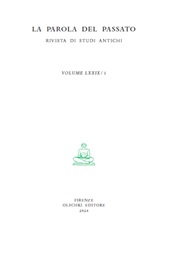Ultimum auxilium : riflessioni in tema di dittatura ed emergenza
P. 49-113
In tempi recenti, è venuta affermandosi in seno alla critica una nuova teoria, che fornisce una spiegazione alternativa del ruolo della dittatura all'interno dell'ordinamento romano repubblicano. Secondo questa tesi, lungi dal costituire un'istituzione cui i Romani ricorrevano in tempi di crisi, i dittatori funzionavano piuttosto come sostituti dei magistrati ordinari, nominati per assolvere compiti di routine in campo militare, elettorale o religioso. In realtà, un esame attento delle attestazioni antiche rivela come, nel corso della lunga storia della dittatura, una funzione emergenziale della dittatura non venne mai meno. Sia pure occasionalmente e in un numero limitato di casi, alcuni dittatori furono senz'altro chiamati a fronteggiare quelle che possono ragionevolmente essere definite serie minacce, in piena sintonia con l'immagine della carica che leggiamo nelle fonti. [Testo dell'editore]
In current scholarship, an alternative theory has emerged in order to explain the dictatorship's role within the Roman republic. According this view, far from being an institution to which the Romans resorted at time of crisis, dictators functioned as substitutes of regular magistrates, appointed to perform routine tasks, ranging from military commands to electoral or religious duties. Nonetheless, a close reading of ancient evidence reveals that, in the long history of the dictatorship, an emergency function never failed. Though occasionally and in a small minority of cases, some dictators really dealt with what could reasonably be described as a serious threat, consistently with the general statements we read in the sources. [Publisher's text]
-
Articles from the same issue (available individually)
-
Information
DOI: 10.1400/299884
ISSN: 2610-8739
DISCIPLINES


